Risk Assessment for Dementia Residents: Impact on the Care Plan
VerifiedAdded on 2023/06/11
|6
|1440
|273
Report
AI Summary
This report focuses on providing a risk assessment for a new resident with dementia in a residential home, emphasizing the factors that could impact the care plan. It addresses changes such as ill health, mobility issues, communication barriers, financial constraints, and behavioral changes that can affect the risk assessment process. The report also discusses the consequences of staff not adhering to the care plan, including breach of legislation, financial misuse, reputational damage, patient injury, and potential fatalities. Furthermore, it outlines the monitoring process involving a supervisor and the use of CCTV to ensure effective care service and patient safety, highlighting the importance of documentation and regular feedback sessions to identify and address any loopholes in the service provided.
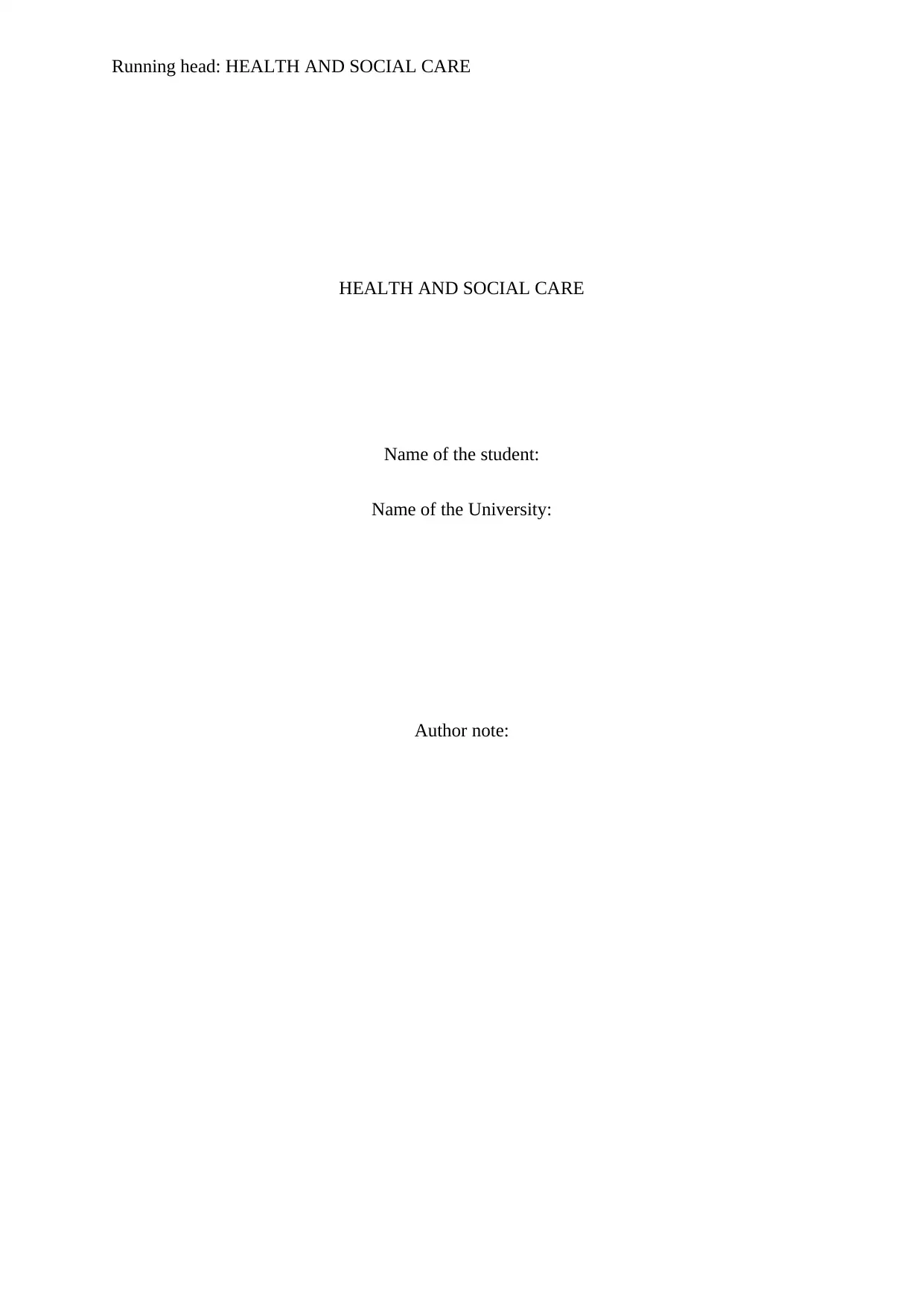
Running head: HEALTH AND SOCIAL CARE
HEALTH AND SOCIAL CARE
Name of the student:
Name of the University:
Author note:
HEALTH AND SOCIAL CARE
Name of the student:
Name of the University:
Author note:
Paraphrase This Document
Need a fresh take? Get an instant paraphrase of this document with our AI Paraphraser
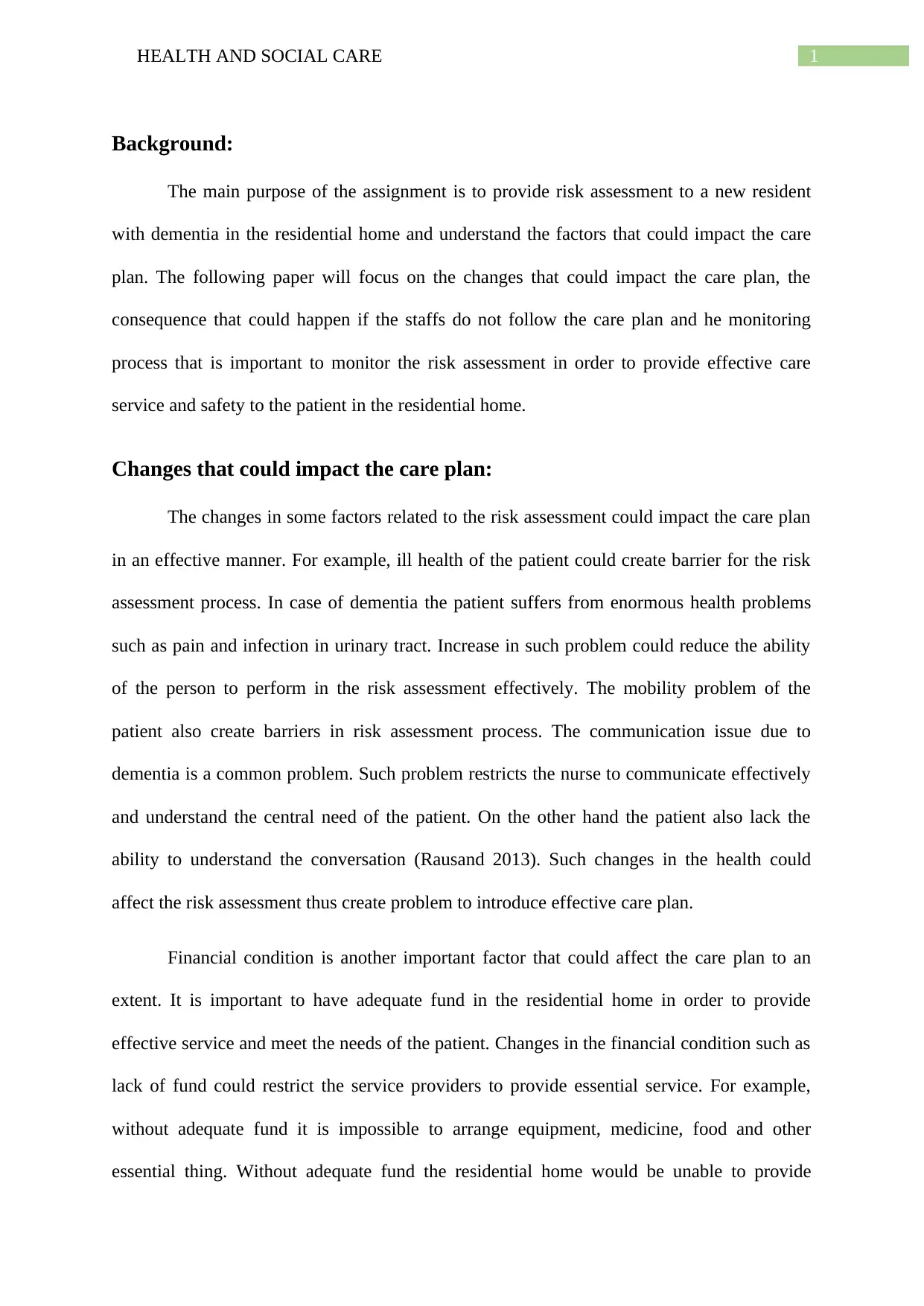
1HEALTH AND SOCIAL CARE
Background:
The main purpose of the assignment is to provide risk assessment to a new resident
with dementia in the residential home and understand the factors that could impact the care
plan. The following paper will focus on the changes that could impact the care plan, the
consequence that could happen if the staffs do not follow the care plan and he monitoring
process that is important to monitor the risk assessment in order to provide effective care
service and safety to the patient in the residential home.
Changes that could impact the care plan:
The changes in some factors related to the risk assessment could impact the care plan
in an effective manner. For example, ill health of the patient could create barrier for the risk
assessment process. In case of dementia the patient suffers from enormous health problems
such as pain and infection in urinary tract. Increase in such problem could reduce the ability
of the person to perform in the risk assessment effectively. The mobility problem of the
patient also create barriers in risk assessment process. The communication issue due to
dementia is a common problem. Such problem restricts the nurse to communicate effectively
and understand the central need of the patient. On the other hand the patient also lack the
ability to understand the conversation (Rausand 2013). Such changes in the health could
affect the risk assessment thus create problem to introduce effective care plan.
Financial condition is another important factor that could affect the care plan to an
extent. It is important to have adequate fund in the residential home in order to provide
effective service and meet the needs of the patient. Changes in the financial condition such as
lack of fund could restrict the service providers to provide essential service. For example,
without adequate fund it is impossible to arrange equipment, medicine, food and other
essential thing. Without adequate fund the residential home would be unable to provide
Background:
The main purpose of the assignment is to provide risk assessment to a new resident
with dementia in the residential home and understand the factors that could impact the care
plan. The following paper will focus on the changes that could impact the care plan, the
consequence that could happen if the staffs do not follow the care plan and he monitoring
process that is important to monitor the risk assessment in order to provide effective care
service and safety to the patient in the residential home.
Changes that could impact the care plan:
The changes in some factors related to the risk assessment could impact the care plan
in an effective manner. For example, ill health of the patient could create barrier for the risk
assessment process. In case of dementia the patient suffers from enormous health problems
such as pain and infection in urinary tract. Increase in such problem could reduce the ability
of the person to perform in the risk assessment effectively. The mobility problem of the
patient also create barriers in risk assessment process. The communication issue due to
dementia is a common problem. Such problem restricts the nurse to communicate effectively
and understand the central need of the patient. On the other hand the patient also lack the
ability to understand the conversation (Rausand 2013). Such changes in the health could
affect the risk assessment thus create problem to introduce effective care plan.
Financial condition is another important factor that could affect the care plan to an
extent. It is important to have adequate fund in the residential home in order to provide
effective service and meet the needs of the patient. Changes in the financial condition such as
lack of fund could restrict the service providers to provide essential service. For example,
without adequate fund it is impossible to arrange equipment, medicine, food and other
essential thing. Without adequate fund the residential home would be unable to provide
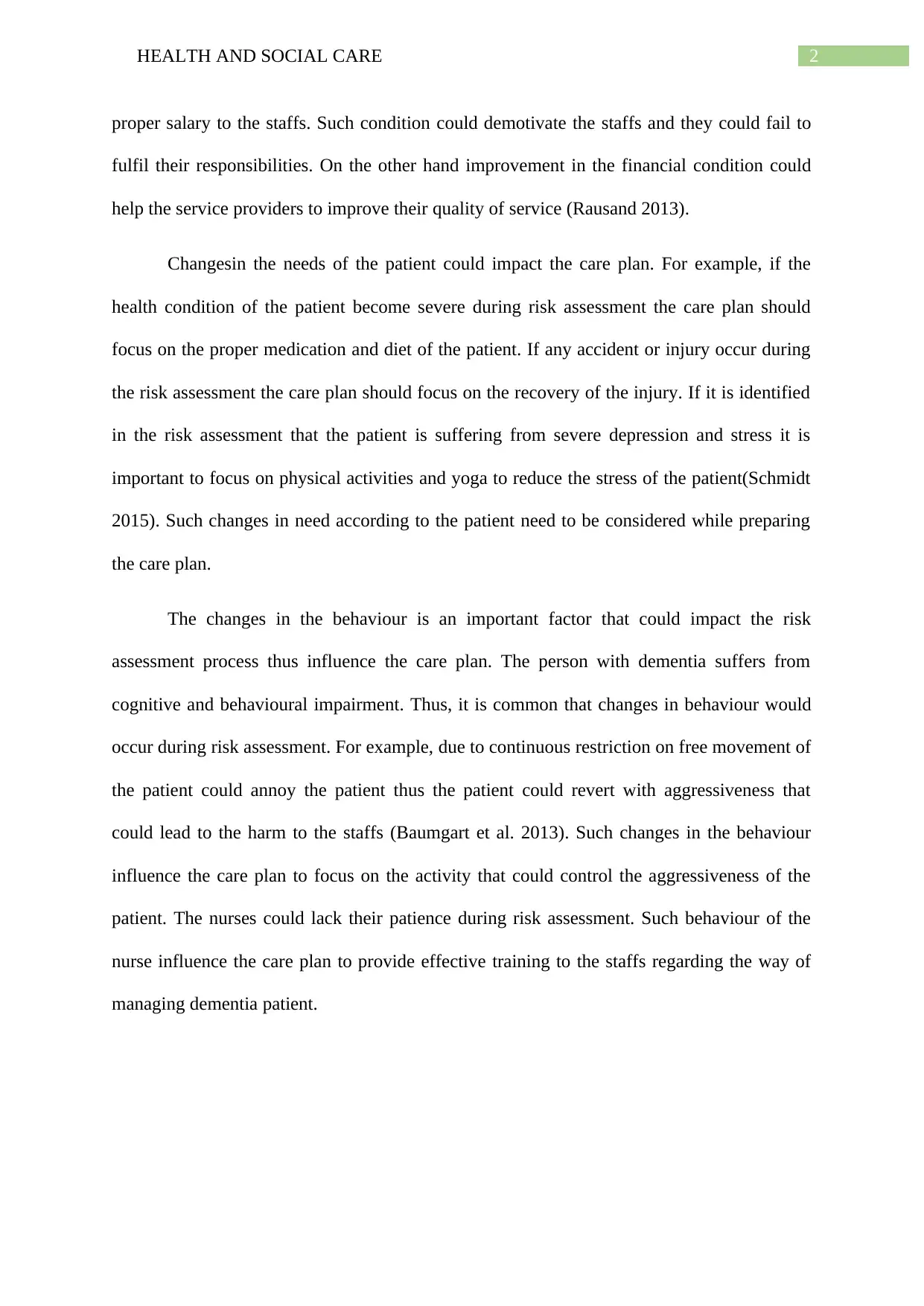
2HEALTH AND SOCIAL CARE
proper salary to the staffs. Such condition could demotivate the staffs and they could fail to
fulfil their responsibilities. On the other hand improvement in the financial condition could
help the service providers to improve their quality of service (Rausand 2013).
Changesin the needs of the patient could impact the care plan. For example, if the
health condition of the patient become severe during risk assessment the care plan should
focus on the proper medication and diet of the patient. If any accident or injury occur during
the risk assessment the care plan should focus on the recovery of the injury. If it is identified
in the risk assessment that the patient is suffering from severe depression and stress it is
important to focus on physical activities and yoga to reduce the stress of the patient(Schmidt
2015). Such changes in need according to the patient need to be considered while preparing
the care plan.
The changes in the behaviour is an important factor that could impact the risk
assessment process thus influence the care plan. The person with dementia suffers from
cognitive and behavioural impairment. Thus, it is common that changes in behaviour would
occur during risk assessment. For example, due to continuous restriction on free movement of
the patient could annoy the patient thus the patient could revert with aggressiveness that
could lead to the harm to the staffs (Baumgart et al. 2013). Such changes in the behaviour
influence the care plan to focus on the activity that could control the aggressiveness of the
patient. The nurses could lack their patience during risk assessment. Such behaviour of the
nurse influence the care plan to provide effective training to the staffs regarding the way of
managing dementia patient.
proper salary to the staffs. Such condition could demotivate the staffs and they could fail to
fulfil their responsibilities. On the other hand improvement in the financial condition could
help the service providers to improve their quality of service (Rausand 2013).
Changesin the needs of the patient could impact the care plan. For example, if the
health condition of the patient become severe during risk assessment the care plan should
focus on the proper medication and diet of the patient. If any accident or injury occur during
the risk assessment the care plan should focus on the recovery of the injury. If it is identified
in the risk assessment that the patient is suffering from severe depression and stress it is
important to focus on physical activities and yoga to reduce the stress of the patient(Schmidt
2015). Such changes in need according to the patient need to be considered while preparing
the care plan.
The changes in the behaviour is an important factor that could impact the risk
assessment process thus influence the care plan. The person with dementia suffers from
cognitive and behavioural impairment. Thus, it is common that changes in behaviour would
occur during risk assessment. For example, due to continuous restriction on free movement of
the patient could annoy the patient thus the patient could revert with aggressiveness that
could lead to the harm to the staffs (Baumgart et al. 2013). Such changes in the behaviour
influence the care plan to focus on the activity that could control the aggressiveness of the
patient. The nurses could lack their patience during risk assessment. Such behaviour of the
nurse influence the care plan to provide effective training to the staffs regarding the way of
managing dementia patient.
⊘ This is a preview!⊘
Do you want full access?
Subscribe today to unlock all pages.

Trusted by 1+ million students worldwide
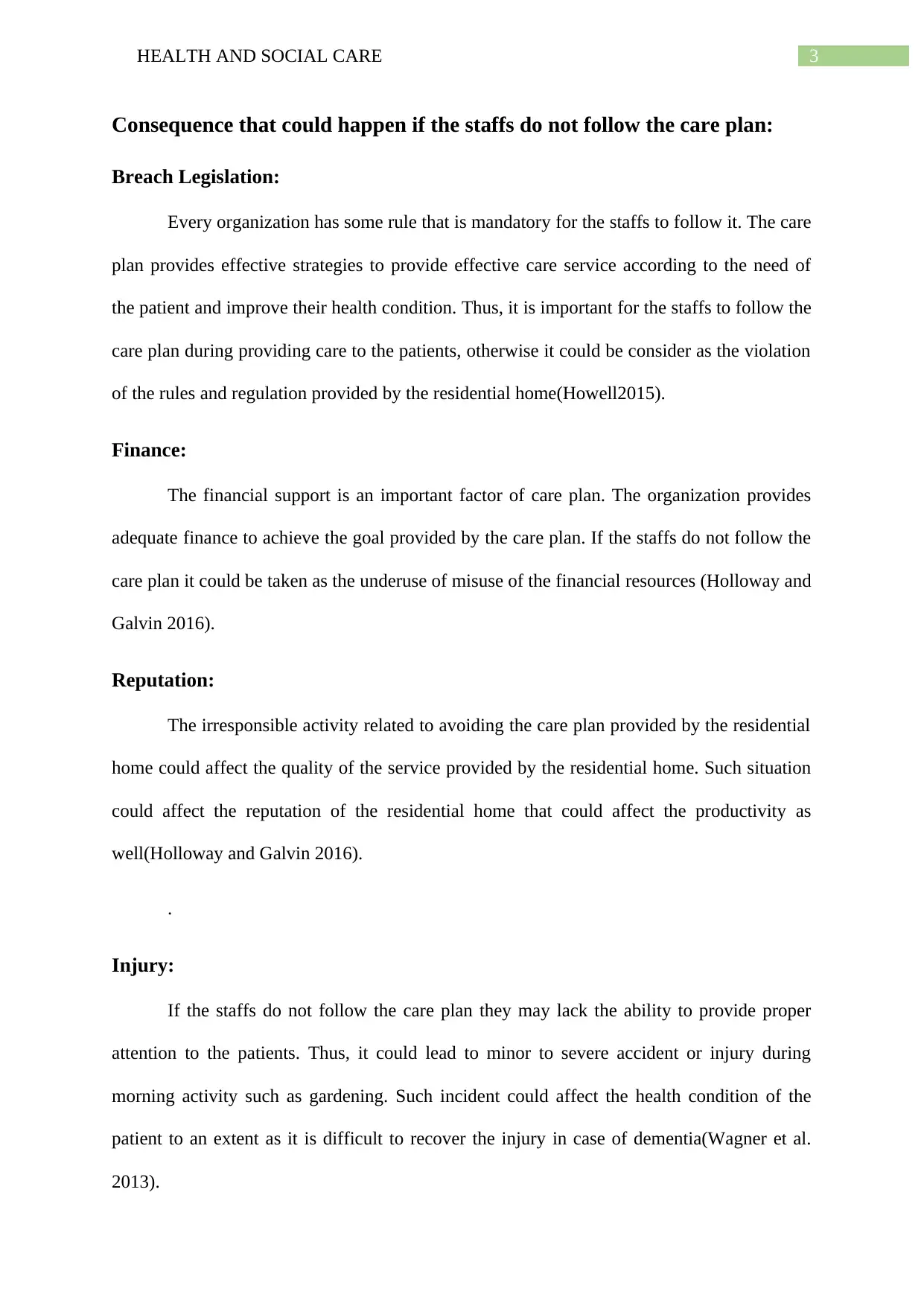
3HEALTH AND SOCIAL CARE
Consequence that could happen if the staffs do not follow the care plan:
Breach Legislation:
Every organization has some rule that is mandatory for the staffs to follow it. The care
plan provides effective strategies to provide effective care service according to the need of
the patient and improve their health condition. Thus, it is important for the staffs to follow the
care plan during providing care to the patients, otherwise it could be consider as the violation
of the rules and regulation provided by the residential home(Howell2015).
Finance:
The financial support is an important factor of care plan. The organization provides
adequate finance to achieve the goal provided by the care plan. If the staffs do not follow the
care plan it could be taken as the underuse of misuse of the financial resources (Holloway and
Galvin 2016).
Reputation:
The irresponsible activity related to avoiding the care plan provided by the residential
home could affect the quality of the service provided by the residential home. Such situation
could affect the reputation of the residential home that could affect the productivity as
well(Holloway and Galvin 2016).
.
Injury:
If the staffs do not follow the care plan they may lack the ability to provide proper
attention to the patients. Thus, it could lead to minor to severe accident or injury during
morning activity such as gardening. Such incident could affect the health condition of the
patient to an extent as it is difficult to recover the injury in case of dementia(Wagner et al.
2013).
Consequence that could happen if the staffs do not follow the care plan:
Breach Legislation:
Every organization has some rule that is mandatory for the staffs to follow it. The care
plan provides effective strategies to provide effective care service according to the need of
the patient and improve their health condition. Thus, it is important for the staffs to follow the
care plan during providing care to the patients, otherwise it could be consider as the violation
of the rules and regulation provided by the residential home(Howell2015).
Finance:
The financial support is an important factor of care plan. The organization provides
adequate finance to achieve the goal provided by the care plan. If the staffs do not follow the
care plan it could be taken as the underuse of misuse of the financial resources (Holloway and
Galvin 2016).
Reputation:
The irresponsible activity related to avoiding the care plan provided by the residential
home could affect the quality of the service provided by the residential home. Such situation
could affect the reputation of the residential home that could affect the productivity as
well(Holloway and Galvin 2016).
.
Injury:
If the staffs do not follow the care plan they may lack the ability to provide proper
attention to the patients. Thus, it could lead to minor to severe accident or injury during
morning activity such as gardening. Such incident could affect the health condition of the
patient to an extent as it is difficult to recover the injury in case of dementia(Wagner et al.
2013).
Paraphrase This Document
Need a fresh take? Get an instant paraphrase of this document with our AI Paraphraser
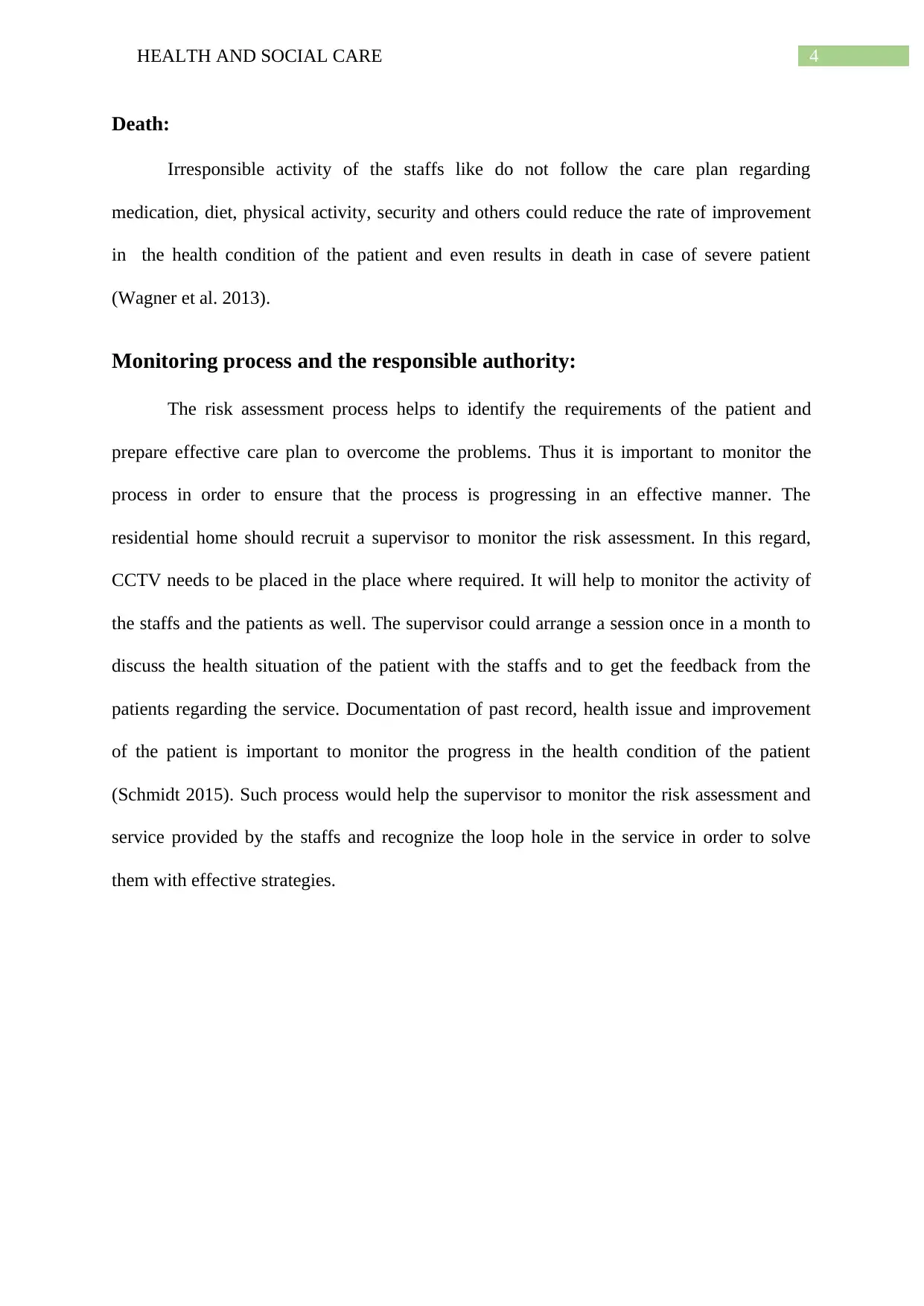
4HEALTH AND SOCIAL CARE
Death:
Irresponsible activity of the staffs like do not follow the care plan regarding
medication, diet, physical activity, security and others could reduce the rate of improvement
in the health condition of the patient and even results in death in case of severe patient
(Wagner et al. 2013).
Monitoring process and the responsible authority:
The risk assessment process helps to identify the requirements of the patient and
prepare effective care plan to overcome the problems. Thus it is important to monitor the
process in order to ensure that the process is progressing in an effective manner. The
residential home should recruit a supervisor to monitor the risk assessment. In this regard,
CCTV needs to be placed in the place where required. It will help to monitor the activity of
the staffs and the patients as well. The supervisor could arrange a session once in a month to
discuss the health situation of the patient with the staffs and to get the feedback from the
patients regarding the service. Documentation of past record, health issue and improvement
of the patient is important to monitor the progress in the health condition of the patient
(Schmidt 2015). Such process would help the supervisor to monitor the risk assessment and
service provided by the staffs and recognize the loop hole in the service in order to solve
them with effective strategies.
Death:
Irresponsible activity of the staffs like do not follow the care plan regarding
medication, diet, physical activity, security and others could reduce the rate of improvement
in the health condition of the patient and even results in death in case of severe patient
(Wagner et al. 2013).
Monitoring process and the responsible authority:
The risk assessment process helps to identify the requirements of the patient and
prepare effective care plan to overcome the problems. Thus it is important to monitor the
process in order to ensure that the process is progressing in an effective manner. The
residential home should recruit a supervisor to monitor the risk assessment. In this regard,
CCTV needs to be placed in the place where required. It will help to monitor the activity of
the staffs and the patients as well. The supervisor could arrange a session once in a month to
discuss the health situation of the patient with the staffs and to get the feedback from the
patients regarding the service. Documentation of past record, health issue and improvement
of the patient is important to monitor the progress in the health condition of the patient
(Schmidt 2015). Such process would help the supervisor to monitor the risk assessment and
service provided by the staffs and recognize the loop hole in the service in order to solve
them with effective strategies.
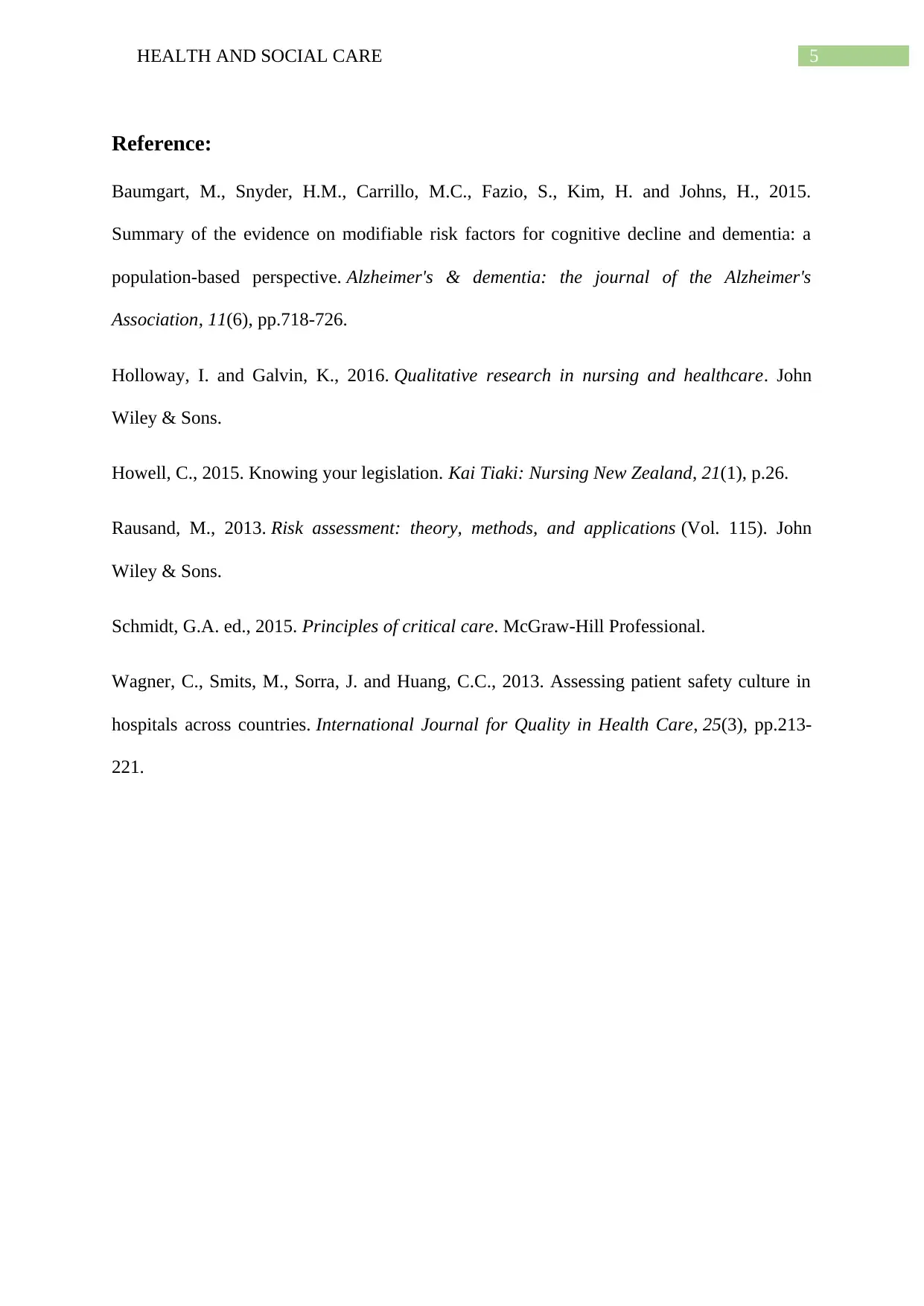
5HEALTH AND SOCIAL CARE
Reference:
Baumgart, M., Snyder, H.M., Carrillo, M.C., Fazio, S., Kim, H. and Johns, H., 2015.
Summary of the evidence on modifiable risk factors for cognitive decline and dementia: a
population-based perspective. Alzheimer's & dementia: the journal of the Alzheimer's
Association, 11(6), pp.718-726.
Holloway, I. and Galvin, K., 2016. Qualitative research in nursing and healthcare. John
Wiley & Sons.
Howell, C., 2015. Knowing your legislation. Kai Tiaki: Nursing New Zealand, 21(1), p.26.
Rausand, M., 2013. Risk assessment: theory, methods, and applications (Vol. 115). John
Wiley & Sons.
Schmidt, G.A. ed., 2015. Principles of critical care. McGraw-Hill Professional.
Wagner, C., Smits, M., Sorra, J. and Huang, C.C., 2013. Assessing patient safety culture in
hospitals across countries. International Journal for Quality in Health Care, 25(3), pp.213-
221.
Reference:
Baumgart, M., Snyder, H.M., Carrillo, M.C., Fazio, S., Kim, H. and Johns, H., 2015.
Summary of the evidence on modifiable risk factors for cognitive decline and dementia: a
population-based perspective. Alzheimer's & dementia: the journal of the Alzheimer's
Association, 11(6), pp.718-726.
Holloway, I. and Galvin, K., 2016. Qualitative research in nursing and healthcare. John
Wiley & Sons.
Howell, C., 2015. Knowing your legislation. Kai Tiaki: Nursing New Zealand, 21(1), p.26.
Rausand, M., 2013. Risk assessment: theory, methods, and applications (Vol. 115). John
Wiley & Sons.
Schmidt, G.A. ed., 2015. Principles of critical care. McGraw-Hill Professional.
Wagner, C., Smits, M., Sorra, J. and Huang, C.C., 2013. Assessing patient safety culture in
hospitals across countries. International Journal for Quality in Health Care, 25(3), pp.213-
221.
⊘ This is a preview!⊘
Do you want full access?
Subscribe today to unlock all pages.

Trusted by 1+ million students worldwide
1 out of 6
Related Documents
Your All-in-One AI-Powered Toolkit for Academic Success.
+13062052269
info@desklib.com
Available 24*7 on WhatsApp / Email
![[object Object]](/_next/static/media/star-bottom.7253800d.svg)
Unlock your academic potential
Copyright © 2020–2026 A2Z Services. All Rights Reserved. Developed and managed by ZUCOL.





